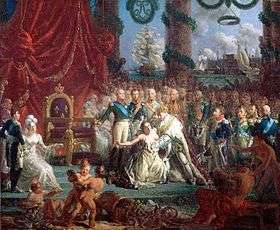Government of the first Bourbon restoration
| Government of the First Bourbon Restoration | |
|---|---|
| cabinet of France | |
|
Louis VIII | |
| Date formed | 13 May 1814 |
| Date dissolved | 19 March 1815 |
| People and organisations | |
| Head of state | Louis XVIII of France |
| History | |
| Predecessor | French provisional government of 1814 |
| Successor | French Government of the Hundred Days |
The Government of the first Bourbon restoration replaced the French provisional government of 1814 that had been formed after the fall of Napoleon. It was announced on 13 May 1814 by King Louis XVIII of France. After the return of Napoleon from exile, the court fled to Ghent and the government was replaced by the French Government of the Hundred Days on 20 March 1815.
Formation

King Louis XVIII made a triumphal return to Paris on 3 May 1814, accompanied by members of the provisional council of state, commissaires of the ministerial departments, marshals of France and Generals. He was greeted by a huge crowd.[1] He named the new ministry on 13 May 1814.[2]
Ministers

The ministers were:[2]
| Ministry | Start | End | Minister |
|---|---|---|---|
| Foreign Affairs | 13 May 1814 | 19 March 1815 | Charles Maurice de Talleyrand-Périgord |
| Justice | 13 May 1814 | 19 March 1815 | Charles Dambray |
| Interior | 13 May 1814 | 19 March 1815 | François-Xavier-Marc-Antoine de Montesquiou-Fézensac |
| War | 13 May 1814 | 3 December 1814 | Pierre Dupont de l'Étang |
| 3 December 1814 | 11 March 1815 | Jean-de-Dieu Soult | |
| 11 March 1815 | 19 March 1815 | Henri Jacques Guillaume Clarke | |
| Finance | 13 May 1814 | 19 March 1815 | Joseph-Dominique Louis |
| Navy and Colonies | 13 May 1814 | 7 September 1814 | Pierre-Victor Malouet |
| 7 September 1814 | 19 March 1815 | Jacques Claude Beugnot | |
| Minister of State | 13 May 1814 | 19 March 1815 | Emmerich Joseph de Dalberg |
| King's Household | 29 May 1814 | 19 March 1815 | Pierre Louis Jean Casimir de Blacas |
Events
On 4 June 1814 the Charter of 1814 was proclaimed, defining the basic constitutional laws of the state.[3] The government soon became unpopular. Some were opposed to the reactionary policies of the government, and some were opposed to the Bourbon dynasty. The clergy openly preached intolerance and persecution of supporters of the former regime, while the army resented the rejection of their achievements under the Empire. Napoleon sensed the change of mood, left Elba and on 1 March 1815 landed on the mainland near Cannes.[4] He traveled north, with supporters flocking to his cause.[5] On 16 March 1815 Louis XVIII addressed a meeting of both chambers, appealing to them to defend the constitutional charter.[6] On the night of 19-20 March the king left his palace for Ghent in Belgium. Napoleon entered Paris on 20 March 1815.[7]
References
Citations
Sources
- Muel, Léon (1891). Gouvernements, ministères et constitutions de la France depuis cent ans: Précis historique des révolutions, des crises ministérielles et gouvernementales, et des changements de constitutions de la France depuis 1789 jusqu'en 1890 ... Marchal et Billard. Retrieved 14 April 2014.
